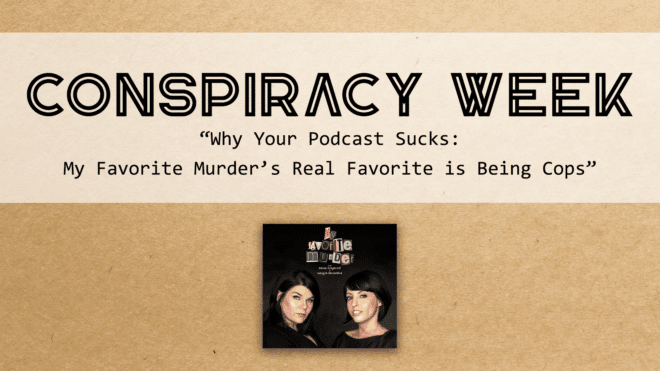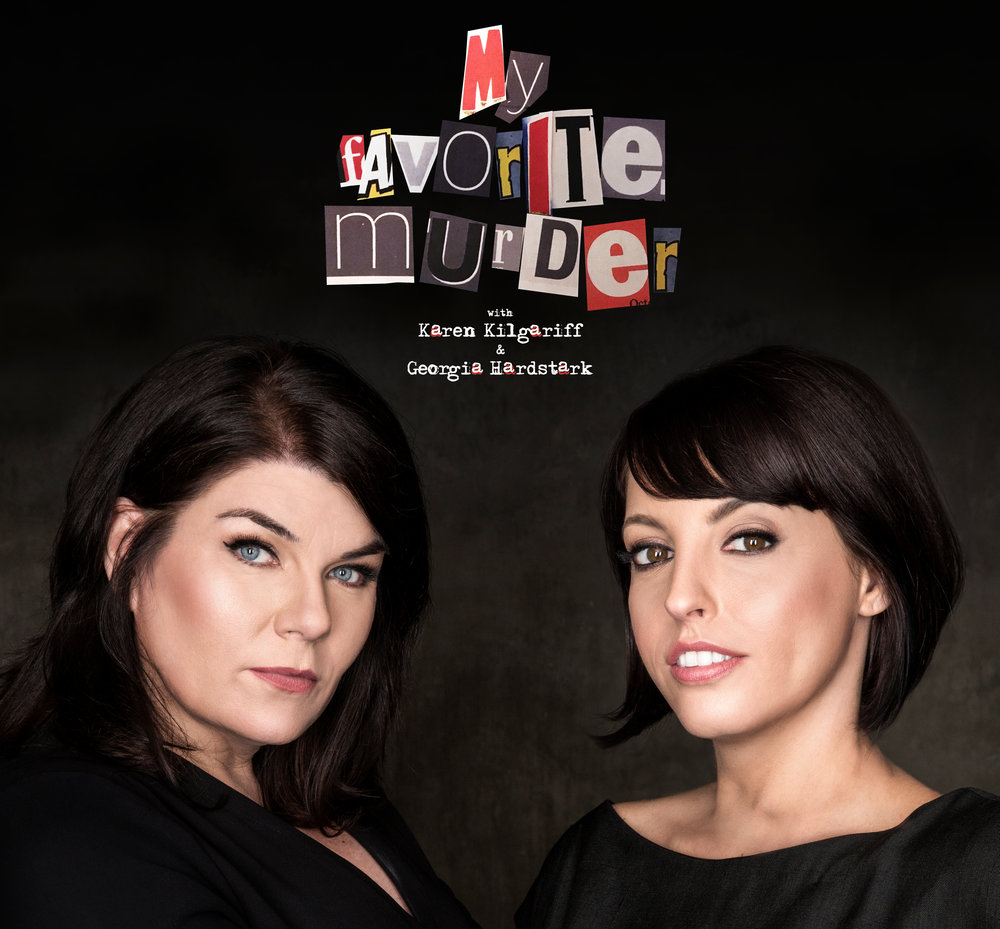Why Your Podcast Sucks: My Favorite Murder’s Real Favorite Is the Cops

The true crime tour-de-force My Favorite Murder occupies a unique place in the hierarchy of shows wherein hosts casually discuss real-world murders and atrocities: it has a legion of loyal fans, a published book, sold out live shows, and dedicated fan club called a Fan Cult. For fans, the show is a light-hearted, welcoming space where people can talk about these horrors of the world with distance and good humor. But what does this MFM safe room look like from the outside? Over the years, hosts Georgia Hardstark and Karen Kilgariff have made podcast hay out of their target demographic, but they’ve done so with a cavalier blindspot to their privilege.
(Editor’s note: This piece is being published anonymously to avoid harassment from the My Favorite Murder fanbase, aka “murderinos.” I’m also not including a listen link for the podcast, because I do not want to.)

True crime and My Favorite Murder
Before we dive into what is sure to be a lively debate about what is or isn’t sexist when critiquing work by women, let’s take a moment to set some boundaries: This piece is not about the genre of true crime podcasts as a whole. The ins and outs of whether it is informative or exploitative to spin entertainment out of real world events and tragedies is a complicated one, and frankly as old as storytelling itself, so it’s not getting solved here. Neither is this a critique of Kilgariff and Hardstark for starting the podcast in the first place. They offered the show up, and audiences chose to listen of their own free will, and two women succeeding at a podcast is not what we’re here to critique.
Read more: I Am Tired of True Crime
What we are here to critique is the personal spin, and the personal biases, presented within any episode of My Favorite Murder. Since the show’s beginning in 2016, American comedians Kilgariff and Hardstark have been bringing weekly episodes in which they each present the story of a real life murder, recapping the events to one-another and sharing commentary as the stories unfold. These murders can be high profile deaths and killers like Aileen Wuornos or the The Who concert disaster of December 3rd, 1979, or less well known stories that a host did more extensive research on.
White women tears
After years of doing these weekly reports (and a second mini-sode each week wherein they read fan messages and fan “hometown murder” stories, which we’ll discuss later), the hosts have defined their reason for doing this show as being a sort of coping mechanism. “This is a dealing with our anxiety podcast, and don’t you fucking judge us for dealing with our anxiety,” said Hardstark at a live show in Dublin 2018. Kilgariff, at the same show, said, “If this is something you might have a problem with, we invite you to fuck off right now.” While coping mechanisms and supportive mental health communities are 100% important, and Kilgariff and Hardstark do deserve commendation for being upfront and honest about their mental health experience, once can’t help but notice a slight disconnect, and a rushing to play the victim, especially in Kilgariff’s words. Warning audiences about the content of an upcoming show is one thing, telling them to “fuck off right now” (and being answered by thunderous applause) is a different matter entirely.
Most people’s means of coping with anxiety isn’t spun into a lucrative podcasting network with merchandise, live shows, and a book deal.
My Favorite Murder has sold true crime obsession as some sort of necessary coping mechanism to its fans, some kind of emergency vent that has to be opened for any sane listener. This is, again, a broader psychological question, whether humans crave and need violent stories or not. However, we can say for certain that most people’s means of coping with anxiety isn’t spun into a lucrative podcasting network with merchandise, live shows, and a book deal. Furthermore, the fact that they feel the need to preemptively condemn anyone who would “judge” (read: critique) the hosts indicates the hosts’ refusal to interrogate their own platform, and the messages they may be spreading with it.
Speaking of the messages they’re spreading, Kilgariff and Hardstark frequently encourage their listeners (predominantly white women) to call the cops whenever they feel vaguely threatened (under the motto of “fuck politeness,” an ethos that feels empowering in a 2nd wave feminist way at best, and a tool of White Feminist self-empowerment at worst). Considering the copious cell phone footage that’s been captured of white women harassing nonwhite people for having the audacity to exist in spaces that white people feel entitled to as their own, it doesn’t take long to imagine the dangers of self-important white women saying “fuck politeness” before calling the cops on the “suspicious” black guy walking around their neighborhood.
Granted, there is the context of sexual violence to consider. Women do run a higher risk of being murdered by a partner or ex, and domestic violence is absolutely a continuous and rampant problem in this country. Trans people likewise face extremely higher likelihood of being murdered or violently assaulted, as do queer people. As do black people, or Asians, following a year of xenophobic hate.
The problem is, Kilgariff and Hardstark aren’t talking about all of these other identities. They’re talking to their audience about situations where you might just feel “skeeved out” by a stranger. And as this country has proven, American white women (the majority of MFM’s fanbase) tend to feel “skeeved out” by people who don’t look like them.
Read more: “Asking for It” Wants Honesty about Queer Domestic Violence
My Favorite Murder is copaganda
In telling their stories, they also frequently laud police with little acknowledgment of police brutality or corruption, or the ways cops are less likely to investigate the murders of non-white, non-straight, non-cis, non-middle-to-upper class victims. What the hosts claim to be an inclusive, communal look into the most horrid crimes is actually, in practice, an example of implicit bias and blindspots run rampant.
Even in stories they discuss that do highlight police negligence, Hardstark and Kilgariff are quick to either move past police misuse of power, or treat these incidents like a total outlier as opposed to actual demonstrable patterns of police abusing their power. For all of the hundreds of murdered they’ve covered, the hosts of My Favorite Murder are always hesitant to point out larger systemic patterns of neglect and abuse. Or perhaps they’re not hesitant to do this; rather, they’re just not interested in it. That’s now what the show is about, after all — My Favorite Murder is not about the systems at play that allow Jeffrey Dahmer to keep killing after police return an escaped victim back to him, it’s just about some pals talking about murder.
Beyond giving police corruption a blind eye, Kilgariff and Hardstark have even indulged in full-on hero worship of police, the most outstanding example being their adulation of Paul Holes. To his credit, Holes was instrumental in finally solving the Golden State Killer case in 2018 (It should be noted that the Golden State Killer, Joseph James DeAngelo, was also a former police officer as well). Kilgariff and Hardstark were huge fans of Holes, contributing to a swell in popularity that made Holes a minor celebrity in true crimes corners of the internet in 2018.
What the hosts claim to be an inclusive, communal look into the most horrid crimes is actually, in practice, an example of implicit bias and blindspots run rampant.
Whiles Holes deserves commendation for helping catch a killer that had been active for four decades, he also functioned within the larger system of American police until his retirement in 2018. However, after his retirement, Holes and journalist Billy Jensen now run the podcast The Murder Squad, where the two discuss unsolved cases and, crucially, solicit investigative help from listeners. This urge to make vigilantes and armchair analysts out of listeners might come from a sincere place, but it does open the show, and the investigators, up to listeners’ own untrained accusations and implicit biases, something the American justice system has enough of already. The Murder Squad is not the same as My Favorite Murder, though it is hosted Kilgariff and Hardstark’s Exactly Right podcast network.
Live episodes of My Favorite Murder also contain their fair share of biases and curious framing of events. As Kilgariff and Hardstark tell their respective stories, audiences will cheer whenever a host mentions a convictions— even when hosts then reveal the person in the story arrested was, in fact, innocent. There’s an auditory bloodlust in these applause — the story is no longer about what happened to the victim, but about what happened to the killer, and the audience is hungry for blood.
Audiences frequently applaud the death penalty when it comes up in the hosts’ stories, which summarizes the atmosphere. Thinking back to the hosts’ comments in Dublin, does this sound like a nice coping mechanism? Or does it sound like what it really is, a live comedy show built around real life tragedies?
The MFM merchandising complicates these blends of vicarious interest and something darker even more. “Fuck Politeness,” as a slogan, is a sort of ethos for the fans (amusingly called “Murderinos,” which is just fun), and also appearing on official MFM merchandise. Further, the show’s official fan group is called ‘The Fan Cult,’ which is on one hand a clearly ironic title, but on the other a casual mocking of people who have been or know people who have been harmed by being caught up in extremist cults.
Promoting a parasocial fanbase
Let’s return to the concept of “Hometowns” — wherein the hosts of MFM encourage listeners to submit own true crime stories from their lives — all well and good, the listeners are consenting adults, they choose to share their stories, but the whole arrangement does have an unsettling parasocial undercurrent: If you want to get in the club, if you want to hear your good friends Karen and Georgia, who share your anxiety, who give you your coping mechanism, you’ll tell them about something violent. Don’t you want to be a real part of the MFM story? To quote another serial killing entertainment icon, “Quid pro quo, yes or no, Clarice?”
Then there’s the show’s closing segment, called “Fuckin’ Hurray,” where Kilgariff and Hardstark close the show with something positive in their lives. Ending their show on a lighter note is a reasonable call, except “Fuckin’ Hurray” is a false equivalency. It seems to put forward the idea that minor pleasures can counteract the loss of life and systemic violence. Yes, Jonbenet Ramsey died at age 6, but on the other hand, have you seen The Alienist?
Thinking back to the hosts’ comments in Dublin, does this sound like a nice coping mechanism? Or does it sound like what it really is, a live comedy show built around real life tragedies?
Stay sexy and don’t get murdered
Finally, looming over all of the other catchphrases and segments is MFM’s main manta: “Stay Sexy and Don’t Get Murdered.” It’s catchy, but it’s also a phrase that casually places the onus of safety onto victims. Neither this or the false equivalence of “Fuckin’ Hurray” are likely intentional in their ramifications, nor did Kilgariff and Hardstark likely intend to define them in these terms. But that’s kind of the point. Whether the hosts intended these meanings or not is irrelevant. The words do it on their own.
That’s the issue with My Favorite Murder overall: It isn’t that they are intentionally white-supremacist copaganda-spreaders looking to indoctrinate their fans. They aren’t, at least not intentionally. What they are is two white women in a prominent entertainment position, occupying a position of power and privilege. They are funny performers, and savvy entertainers, and likely do have their hearts in the right place. When they throw stones, they likely aren’t aiming for anyone’s head. But whatever they intended to hit, wherever they intended the stones to land, the ripples they cast exist all the same.
My Favorite Murder is a show that knows not what it does, but that’s not actually an excuse. The hosts of My Favorite Murder can encourage us to “Stay Sexy and Don’t Get Murdered” all they like, but for themselves, they might consider a more direct slogan: “Do Better.”













Comments
Comments are closed.